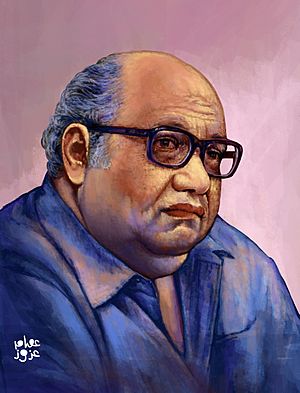Salah Jahin facts for kids
Quick facts for kids
Salah Jahin
|
|
|---|---|
 |
|
| Born | December 25, 1930 Cairo, Egypt |
| Died | April 21, 1986 (aged 55) Cairo, Egypt |
| Occupation | poet, lyricist, playwright and cartoonist |
| Nationality | Egypt |
Salah Jahin (full name Muhammad Salah Eldin Bahgat Ahmad Helmy) was a very important Egyptian poet, lyricist (someone who writes song words), playwright (someone who writes plays), and cartoonist. He was born on December 25, 1930, and passed away on April 21, 1986. He is remembered for his amazing work in Egyptian art and culture.
Contents
Life and career
Salah Jahin was born in Cairo, Egypt, in 1930. He came from a middle-class family. He studied law at Cairo University. In 1955, he started working as a cartoonist for an Egyptian magazine called "Rose al-Yousef."
A year later, he moved to a new magazine, "Sabah el-Khair," where he became the main editor. After that, he joined the famous newspaper "Al-Ahram."
Salah Jahin, along with another poet named Fuad Haddad, helped develop Egyptian "colloquial poetry." This means poetry written in the everyday language that people spoke, not the very formal Arabic. Before this, poetry in everyday Egyptian Arabic was often seen as simple folk art. But in 1961, Salah Jahin and other young poets helped make it a respected form of poetry.
He wrote several plays for puppet theaters. He was also famous for his patriotic songs that celebrated Egypt. Many of these songs were sung by the well-known Egyptian singer Abdel Halim Hafez. Salah Jahin was greatly inspired by the 1952 Revolution in Egypt.
After Egypt's defeat in the Six-Day War in 1967 and the death of President Gamal Abdel Nasser in 1970, Salah Jahin became very sad. He felt that the world around him had changed a lot.
Besides political poems, Jahin's poems often explored big questions about life. He wrote about why humans exist, what is good and evil, and how much freedom and happiness people can find.
In 1965, Salah Jahin received a special award called the Egyptian Order of Science and Arts of the First Class. He passed away in 1986 when he was 55 years old.
Works
As a poet
Ruba'iyat (Quatrains)
In 1963, Salah Jahin wrote his quatrains, also known as rubaiyat. These were short poems, usually four lines long. In them, he shared his beliefs, feelings, and thoughts about life, existence, and good and evil. Each verse often ended with a phrase like "Agabi," which means "how strange!" Many people think these quatrains are one of the greatest popular poetry achievements in Egypt in the last 50 years.
In Egypt's Name
In 1971, Jahin wrote "Ala Esm Masr," which means "In Egypt's Name." This was a long epic poem that told the history of Egypt. It started from the time of the pharaohs until his present day. Each verse ended with the same phrase, "Ala esm Masr," but each time it had a new meaning. In this poem, Jahin showed his deep love for his country. In one part, he says:
- "History may say what it wishes in Egypt name
- Egypt, for me, is the most beloved and most beautiful of things.
- I love her when she owns the earth, east and west.
- And I love her when she is down, wounded in a battle.
- I love her fiercely, gently and with modesty.
- I hate her and curse her with the passion of the lovesick.
- I leave her and flee down one path, and she remains in another.
- She turns to find me beside her in misfortune.
- My veins pulsating with a thousand tunes and rhythms.
- In Egypt's name."
Other poetry books
His other books of everyday poetry include:
- An al-qamar wa al-teen (1961)
- Qasaqis Waraq (1966)
- Dawawin Salah Jahin (1977)
- Angham Siptambirriyah (1984)
As a cartoonist
Salah Jahin started his career as a cartoonist. He drew many cartoons for magazines like "Rose al-Yousef" and "Sabah el-Khair."
Other works
Salah Jahin wrote the lyrics for many songs, especially patriotic ones sung by Abdel Halim Hafez. Some of his famous songs include "Soura" (Photo), "ehna elsha'b" (We Are the People), and "Khally elselah sahy" (Oh Weapon, Be Ready).
He also wrote for the puppet theater, including the famous musical play "El-leila el-kebira" (The Grand Night). Jahin also worked as a film producer, screenwriter (writing movie scripts), and an actor.
Some of the movies he wrote scripts for include:
- "Awdat al ibn al dal" (The Return of the Prodigal Son), directed by Youssef Chahine.
- "El less wal kilab" (The Thief and the Dogs), based on a novel by Naguib Mahfouz.
- "Shafika we Metwali" (Shafika and Metwali).
- "Khally ballak men Zouzou" (Watch Out for Zouzou).
- "Amira Hoby Ana" (Amira My Sweetheart).
In "Khally ballak men Zouzou" and "Amira Hoby Ana," the famous Egyptian actress Suad Husni sang some of her most beautiful songs, like "Ya wad ya te'eel" and "El-hayah ba'a lonha bamby" (Life Has Turned Pink).
Salah Jahin also wrote the scripts and lyrics for the "Riddles" television series. This show had a riddle in each episode and was shown during the month of Ramadan for several years. He also wrote for the TV show "Howa wa heya" (He and She), starring Ahmad Zaki and Suad Husni.
In 2010, the Egyptian singer Tony Kaldas created a new song using Jahin's lyrics, performing it in a classical style with a piano.
Legacy
On December 25, 2013, Google Doodle celebrated Salah Jahin's 83rd birthday. This showed how important he was and how much he is remembered.
 | Emma Amos |
 | Edward Mitchell Bannister |
 | Larry D. Alexander |
 | Ernie Barnes |

